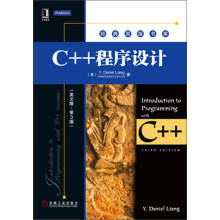Chapter 1 Introduction to Computers,Programs, and C++
1.1 Introduction
1.2 What is a Computer?
1.3 Programming Languages
1.4 Operating Systems
1.5 History of C++
1.6 A Simple C++ Program
1.7 C++ Program-Development Cycle
1.8 Programming Style and Documentatjon
1.9 Programming Errors
Chapter 2 Elementary Programming
2.1 Introduction
2.2 Writing a Simple Program
2.3 Reading input from the Keyboard
2.4 Identifiers
2.5 Variables
2.6 Assignment Statements and Assignment Expressions
2.7 Named Constants
2.8 Numeric Data Types and Operations
2.9 Evaluating Expressions and Operator Precedence
2.10 Case Study: Displaying the Current Time
2.11 Augmented Assignment Operators.
2.12 Increment and Decrement Operators
2.13 Numeric Type Conversions
2.14 Software Development Process
2.15 Case Study: Counting Monetary Units
2.16 Common Errors
Chapter3 Selections
3.1 Introduction
3.2 The bool Data Type
3.3 if Statements
3.4 Two-Way if-else Statements
3.5 Nested if and Multi-Way if-else Statements
3.6 Common Errors and Pitfalls
3.7 Case Study: Computing Body Mass Index
3.8 Case Study: Computing Taxes
3.9 Generating Random Numbers
3.10 Logical Operators
3.11 Case Study: Determining Leap Year
3.12 Case Study: Lottery
3.13 switch Statements
3.14 Conditional Expressions
3.15 Operator Precedence and Associativity
3.16 Debugging
Chapter 4 Mathematical Functions, characters, and Strings
4.1 Introduction
4.2 Mathematical Functions
4.3 Character Data Type and Operations
4.4 Case Study: Generating Random Characters
4.5 Case Study: Guessing Birthdays
4.6 Character Functions
4.7 Case Study: Converting a Hexadecimal Digit to a Decimal Value
4.8 The string Type
4.9 Case Study: Revising the Lottery Program Using Strings
4.10 Formatting Console Output
4.11 Simple File Input and Output
Chapter 5 Loops
5.1 Introduction
5.2 The while Loop
5.3 The do-while Loop
5.4 The for Loop
5.5 Which Loop to Use?
5.6 Nested Loops
5.7 Minimizing Numeric Errors
5.8 Case Studies
5.9 Keywords break and continue
5.10 Case Study: Checking Palindromes
5.11 Case Study: Displaying Prime Numbers
Chapter 6 Functions
6.1 Introduction
6.2 Defining a Function
6.3 Calling a Function
6.4 void Functions
6.5 Passing Arguments by Value
6.6 Modularizing Code
6.7 Overloading Functions
6.8 Function Prototypes
6.9 Default Arguments
6.10 Inline Functions
6.11 Local, Global, and Static Local Variables
6.12 Passing Arguments by Reference
6.13 Constant Reference Parameters
6.14 Case Study: Converting Hexadecimals to Decimals
6.15 Function Abstraction and Stepwise Refinement
Chapter 7 Single-Dimensional Arrays and C-Strings
7.1 Introduction
7.2 Array Basics
7.3 Problem: Lotto Numbers
……
Chapter 8 Multidimensional Arrays
Chapter 9 Objects and Classes
Chapter 10 Object-Oriented Thinking
Chapter 11 Pointers and Dynamic Memory Management
Chapter 12 Templates, Vectors, and stacks
Chapter 13 File Input and Output
Chapter 14 Operator Overloading
Chapter 15 Inheritance and Polymorphism
Chapter 16 Exception Handing
Chapter 17 Recursion
APPENDIXES
INDEX
CREDIT

 缺书网
缺书网 扫码进群
扫码进群






